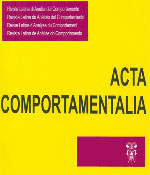Análisis de las interacciones madre-hijo retardado: una perspectiva interconductual
DOI:
https://doi.org/10.32870/ac.v2i1.18226Keywords:
retardation, functional analysis, mother-child interactions, interaction contextAbstract
Fourteen mother-retarded child dyada were formally and functionally classified in their interactions in four different contexts: feeding, personal cleaning, homework and free play. Categories employed to analyze those interactions were derived from interactive functional levels proposed by Ribes and López. (1985). Data showed that most mothers did not promote the interactions of their children with the physical or social environment. Only in three dyada, mothers promoted in their children the direct manipulation of the physical environment as well as the manipulation of the environment through gestures and linguistic response. Contexts may be responsible of the differences observed regarding the behaviors promoted by mothers. In homework and feeding contexts, mothers did not promote any behavior. In personal cleaning and free play contexts most mothers promoted high levels of direct manipulation of the physical environment. Additionally, only in the free play context, three mothers intensively promoted in their children the indirect manipulation of the environment through language.
Downloads
Downloads
How to Cite
Issue
Section
License

<a rel="license" href="http://creativecommons.org/licenses/by-nc-sa/4.0/"><img alt="Licencia de Creative Commons" style="border-width:0" src="https://i.creativecommons.org/l/by-nc-sa/4.0/88x31.png" /></a><br />Este obra está bajo una <a rel="license" href="http://creativecommons.org/licenses/by-nc-sa/4.0/">licencia de Creative Commons Reconocimiento-NoComercial-CompartirIgual 4.0 Internacional</a>.






